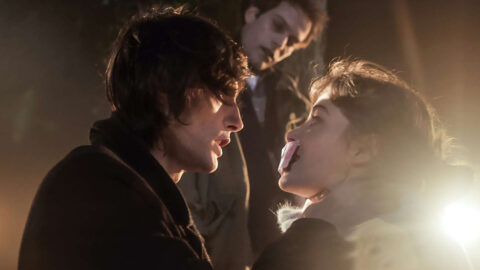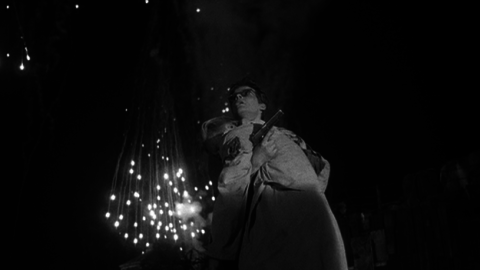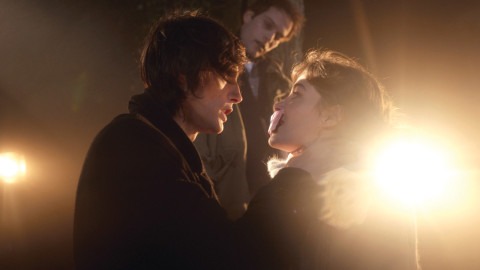Film Comment Selects: Andrzej Żuławski
The following article was completed before the passing of Andrzej Żuławski. His peerless films can be seen in Film Comment Selects at the Film Society Lincoln Center starting this Friday, featuring in-person appearances by Żuławski collaborators: composer Andrzej Korzynski, cinematographer Andrzej Jaroszewicz, actor Jonathan Genet, and film scholar Daniel Bird.
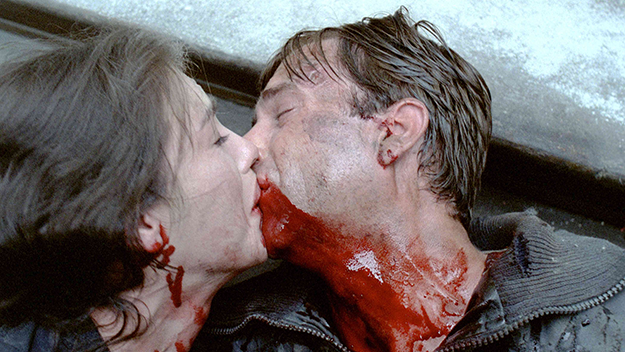
Possession
My first encounter with Andrzej Żuławski’s cinema was in my mid-teens. Possession (81) was both exhilarating and disturbing. What struck me first were the performances—surrealistic in the sense that they exceeded realism. Coming from a nation whose national character is epitomized by a stiff upper lip, the lips in Żuławski’s films were often full, frequently bloodied, but never, ever stiff. In fact, a scarred lip is one of the key images of Witold Gombrowicz’s Cosmos, the book upon which Żuławski’s most recent film is based.
The second thing which struck me was Żuławski’s mise en scène. In two words: clear and precise. Some equate shallow depth of field with that “cinematic feel.” Not Żuławski. By and large, his approach to filmmaking relies on short-focal-length lenses, giving a wide field of vision, with a large depth of field, so that both the foreground and the background are in focus. Close-ups act as a sort of cinematic punctuation. In a word: Wellesian. Over the years, I have been fortunate enough to witness Żuławski at work on set. This approach to filming is a veritable high-wire act. He shoots each set-up in sequence, with little or no coverage—the shots cut together as written in the script. Cosmos, for example, finished shooting just before Christmas, 2014, and a few weeks into January I was watching the almost-final cut. This approach to cinema places a huge amount of pressure on every member of the crew—the production designer, the camera and sound teams, and, above all else, the actors. If anyone deems the results “un-cinematic,” then I am afraid we have two wildly divergent concepts of cinema.
Finally, I was struck by Żuławski’s approach to storytelling, particularly regarding structure and dialogue. Rarely are scenes bound by a cause-and-effect logic, and ellipses are frequent, as are deliberately jarring shifts in time and space, such as the infamous “miscarriage” scene in Possession. Dialogue, on the other hand, is rarely a means of conveying plot in Żuławski’s films. The only way I can begin to describe Isabelle Adjani’s to-camera monologue in Possession is by turning to how T. E. Lawrence characterized Conrad’s prose: “It’s not built in the rhythm of ordinary prose, but on something existing only in his head, and as he can never say what it is he wants to say, all his things end in a kind of hunger, a suggestion of something he can’t say or do or think.” This is the point where, in Żuławski’s cinema, words end and purely physical expression begins. It is necessary to get away from the idea of placing Żuławski in the context of a national cinema (i.e., Polish or French) or genre (e.g., the idea of Possession as a Cronenberg-esque body horror). Żuławski’s 20-odd books have yet to appear in English translation. He is, fundamentally, a writer who makes films—a writer in the tradition of Conrad, Adolf Rudnicki, or Gombrowicz.
* * *
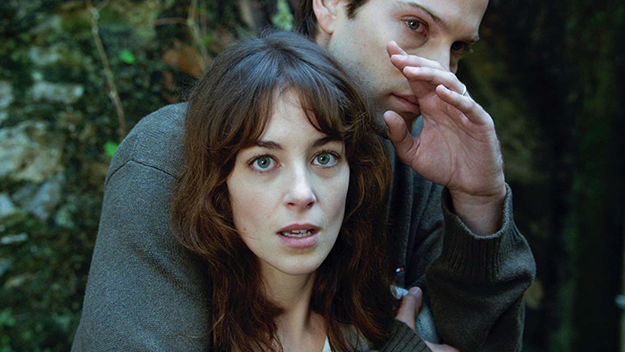
Cosmos
Over the years I have found myself working between Żuławski and festivals, distributors and producers. Not long after graduating, Żuławski recommended me for a stipend to study in Warsaw. He introduced me to his regular cinematographer, Andrzej Jaroszewicz; costume designer, Magdalena Tesławska and composer, Andrzej Korzyński. In the years that followed, Żuławski’s films and Korzyński’s soundtracks began to appear on DVD and vinyl, and that meant ensuring finding masters, making subtitles, producing supplementary features (i.e., The Other Side of the Wall, a documentary about the making of Possession), and, more recently, coordinating institutions to produce restorations (for On the Silver Globe and others).
Of Żuławski’s film projects, I only became involved in Cosmos during the postproduction, specifically the subtitling, but prior to that there were several other attempts to get projects off the ground, most notably Dark Matter. He also wrote a seven-part film called Music, and we worked on a project called Tiger, which started life as a project for Golan and Globus during the 1980s. In terms of the actual writing, Żuławski is not a collaborator, except when it comes to dialogue in French or English. With Cosmos, I would come to his home prepared with a rough translation, and we would rework and refine approximately six or seven pages of dialogue per afternoon.
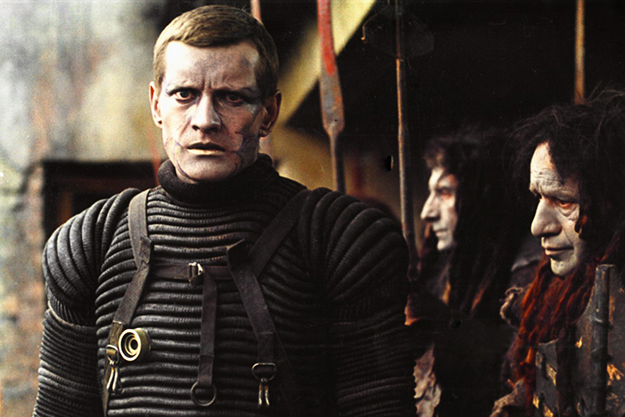
On the Silver Globe
One thing that becomes obvious when working with Żuławski is his use of citations. Cosmos opens with the first lines from Dante’s Inferno and also features a poem by Fernando Pessoa in both French translation and the original Portuguese. The Third Part of the Night uses chapters from The Book of Revelations as a sort of refrain. It also features lines from a poem by Juliusz Słowacki and name-checks Conrad, Proust, and Céline. On the Silver Globe features citations from Swedenborg, Sufi and Buddhist texts, Meister Eckhart, the Gospel of Saint Thomas, Hegel, Martin Buber, etc.
Żuławski is a voracious reader. The last three titles he loaned me were a book by Pico Ayer, another about the friendship and estrangement of Rousseau and Hume, and The Film Club by David Gilmour. All of these books were carefully annotated in pencil and passages were underlined, some of which would later find themselves quoted in both Żuławski books and film scripts. The same could happen to people who knew Żuławski: appearing in some form in his books. At first I was not thrilled about my cameo appearances in Żuławski’s books. But this I discovered is an occupational hazard for those who are close to the director.
* * *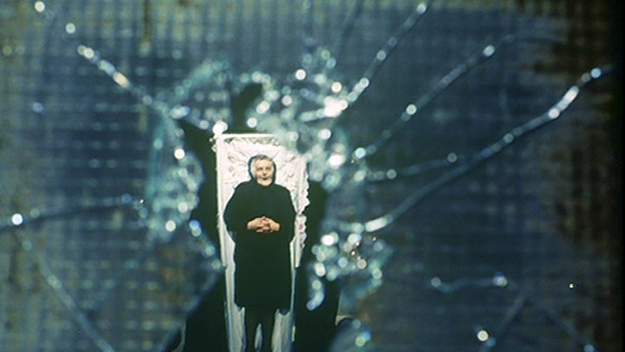
The Third Part of the Night
Toward the end of his life, Gombrowicz was interviewed about his work, and the subject turned to Borges. For Gombrowicz, Borges’s subject was literature, whereas his subject was, conversely, life. This brings to mind the Lebensphilosophie which followed the outbreak of the First World War, which was anticipated by the likes of Nietzsche, Schopenhauer, and Bergson, and was crystallized by Georg Simmel as a dialogue between life and culture. It is also completely at odds with a film culture which, for nearly two decades, is still struggling to shrug off the intellectual corpse of postmodernism. By this I mean the analysis and creation of films in reference to other films. The resulting analyses and films appear to have been conceived in the hall of mirrors that ends The Lady of Shanghai. Despite the homage to the spiral staircase in Andrzej Wajda’s A Generation, Żuławski’s debut, The Third Part of the Night (71) is rooted in his father’s personal experiences as a member of the Home Army during the Second World War, not to mention Rudnicki’s prose. Above all else, Żuławski’s debut launched a project with which he would toil for the next 45 years: the re-introduction of metaphysics into cinema. The best example of his strategy is the appearance of the monster in Possession: anyone who seeks out Possession as a monster movie is going to be perplexed, disappointed, or, perhaps, intrigued.
Almost 20 years ago, I absconded to Paris for a week, escaping undergraduate studies, to interview Żuławski. He told me that if I wanted to understand cinema, I ought to buy a plane ticket to Madrid, go to the Prado and look at Velazquez’s Las Meninas. Practically all of Żuławski’s films are cinematic forms of mise-en-abyme, and Cosmos is no exception. Conversely, I say that, to understand Żuławski, buy a plane ticket to Warsaw, go to the National Museum and look at a painting called Stańczyk by Jan Matejko. Stańczyk, a court jester, sits, in costume, with a solemn face. In the background is a deluded, almost hysterical dance, and outside is a foreboding comet. There is a difference between playing the fool and being one. Żuławski’s approach to directing actors and working in genre is, essentially, parodic. Those distended, extenuated gestures and expressions, like Gombrowicz, amount to a set of masks. Ditto his excursions into seemingly low-brow genres. Take, for example, L’Amour braque (85), which transposes Dostoevsky’s The Idiot to a contemporary Paris where neon lights glisten in puddles as if rendered in some bande dessinée noir. As Bakhtin made clear, parody is essential not just to Dostoevsky, but to the novel genre itself. L’Amour braque has yet to be appreciated as a truly great Dostoevsky film, not so much an adaptation as a response.
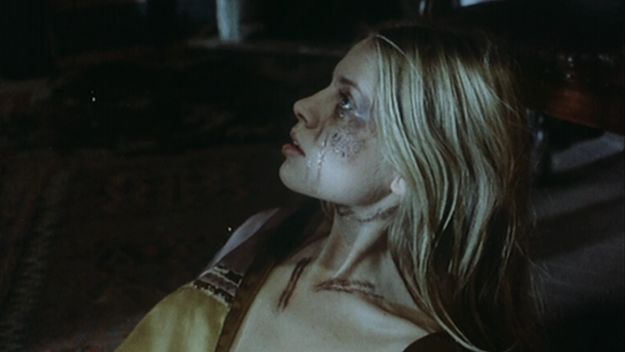
The Devil
Stańczyk’s “entertainer” role was a ruse, a sleight-of-hand trick which masked a profound insight into Poland’s past, present, and future. I think of Stańczyk’s cynicism, his pessimism whenever I look at Żuławski’s The Devil (72), because it underlines Poland’s innate capacity for self-destruction. Communist Poland destroyed itself, just as Polish actions resulted in its partitioning during the eighteenth century. Only very recently Poland rewrote its own constitution, effectively undermining a 40-year struggle for freedom. Whereas Wajda’s political cinema is direct, Żuławski’s is oblique. Ostensibly a Gothic horror, The Devil nevertheless alluded to the role of the Minister of the Interior in the Warsaw student riots of March ‘68—which in turn led to the expulsion of Jews from the Polish Communist Party—and was promptly banned by the authorities. However, the official reason for suppressing the film was, perversely, because The Devil upset what one would have thought to be the enemy of the Polish Communist Party: the Catholic Church.
Similarly, Żuławski’s broken masterpiece, On the Silver Globe (88), appears to be the story of a heartbroken astronaut who flings himself into space to escape a failed relationship (On the Silver Globe is the reverse side of Possession), but it touches on the relationship between acting and religion, as well as that of organized religion and politics. Filmed in the years before John Paul II’s celebrated visit to Poland, not to mention the formation of the Free Trade Union Solidarity, On the Silver Globe was simply decades ahead of its time.
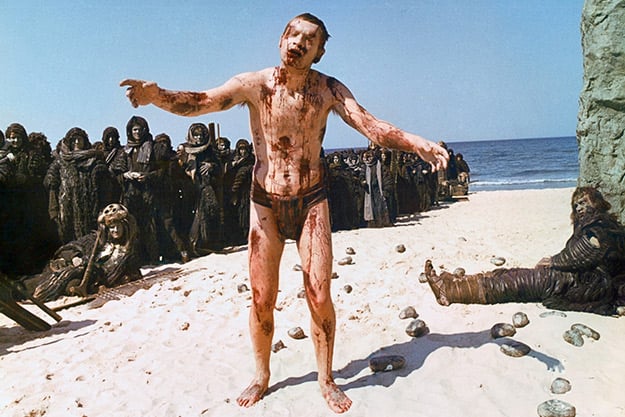
On the Silver Globe
I cannot think of two films which say more about the problems facing Poland today than The Devil and On the Silver Globe. Deeply disturbing and highly prophetic, they encapsulate the Polish predicament in a manner that can only be compared to the way Aleksei German’s films dealt with both Russia’s Stalinist past and, in Hard to Be a God, Putin’s Russia. Quite simply, now is the perfect time to discover the bizarre, brilliant, and grotesquely funny films of Andrzej Żuławski.
Daniel Bird is a film scholar and curator.




